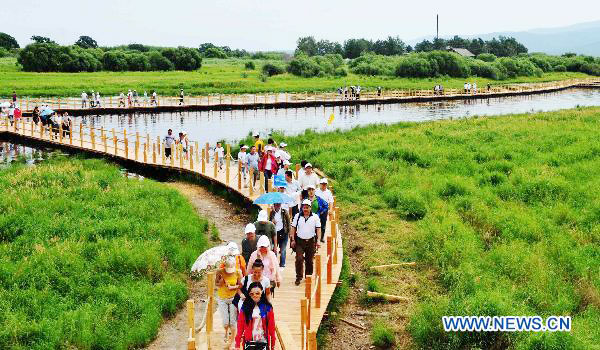Sino-Russian border island opens to Chinese tourists
HEIXIAZI ISLAND, Heilongjiang -- One hundred and fifty Chinese tourists landed on the Chinese part of Heixiazi Island, a Sino-Russian border island in northeast China's Heilongjiang Province, on Wednesday morning.
The 335-square-km island was the last disputed area on the Sino-Russian border, and Chinese were not allowed on the island for more than 80 years.
However, as the result of a recent border settlement agreement between China and Russia, half of the island now belongs to China, with the other half going to Russia.
A border redrawing ceremony was held on the island on Oct. 14, 2008, with 171 square km of the island's territory and nearby waters going to China.
By then, the whole of 4,300-km-long Sino-Russian border was finally clarified.
The peaceful solution was achieved via bilateral concessions after 40 years of negotiations. The peaceful, fair and equal negotiations set a positive example for how to solve international disputes.
The two sides have agreed to cooperatively develop the island into an eco-tourism zone, according to a joint statement issued after a meeting between the Chinese and Russian prime ministers in November 2010.
There are currently two tours designed for the island: a six-hour ship tour and a land tour.
The ship tour brings visitors from the Chinese and Russian sides to the waters around the island, while the land tour includes major attractions such as a former Russian military camp and a commemorative area for the signing of the 2008 Sino-Russia agreement. Tourists can also visit China's easternmost border guardpost in Wusu County and watch an early sunrise.
"I'm so lucky to be part of the first group of tourists to visit Heixiazi," said Yu Zaifu, a resident of Harbin, the capital of Heilongjiang.
"I have been longing for this moment for quite a long time, and today I finally made it," Yu said.
"I saw the forests, meadows, marshes and ponds here, as well as the border stone and the Russian Church. I will definitely bring my family here," Yu said.
"The island is pretty beautiful. I'm proud to witness its return to China," said 73-year-old Harbin resident Liu Liping, the oldest member of the tour group.
"It took me two days to get here by bus. The bumpy journey actually exhausted me. But it was worth it," she said.
The tourists were all cheered up in front of the former military camp, which was surrounded by wire nets, although the tour bus did not stopped.
"I'm wondering what it looks like inside. Is it different from Chinese military camps? Are there old weapons left in there?" asked a tourist named Wang Zhongyan.
The island's border stone provided many photo opportunities for the tourists, with one tourist named Wang Shuang referring to it as the "main dish" of their visit.
"Many people came here simply for the stone. Heixiazi is not only a border island, it is a witness to a history of conflict and friendship between China and Russia," she said.
In a village located a few miles away from the island, 45-year-old fisherman Zhou Jun said his family has seen Sino-Russian relations change on the border over the years.
He said that his grandfather was able to go to the island to go fishing, but his father never had the same opportunity.
"When there were tensions between the two countries, our nets would be confiscated by Russian soldiers if we went across the border a bit. However, the Russians have been much more friendly over the past three years," Zhou said.
China and Russia have reached an agreement on how to protect and develop the island, with ecological protection taking top priority in the island's development.
The island's ecosystem is relatively complex, as it includes a variety of biomes such as forests, meadows and swamps. Seven species of endangered plants and 44 species of endangered animals have been discovered on the island, according to Yan Shentang, an engineer with Heilongjiang's forestry planning bureau.
The island's ecosystem will provide new resources for genetic researchers, as it has been relatively unaffected by human activity until now. "The research that will be conducted on the island's ecosystem will mean a lot for local environmental protection and economic development," Yan said.
Local authorities have put up over 200 signs around the island encouraging visitors to cherish and protect the island's environment.
A planned wetland nature reserve will eventually cover an area of 131 square km, or 75 percent of the Chinese share of the island, with the rest set aside to be developed for trade and tourism. The local government will create regulations concerning the protection of the island's ecosystem, according to Yan.
Russia will also open its half to tourists, but has not established a timetable for doing so, according to the Sino-Russian development plan.
Russia's Information Telegraph Agency (ITAR-TASS) said on January 12 that the country will spend 19.3 billion rubles (687 million U.S. dollars) to build an international recreation center with a hotel, a water park and more than 470 residences on the island.















